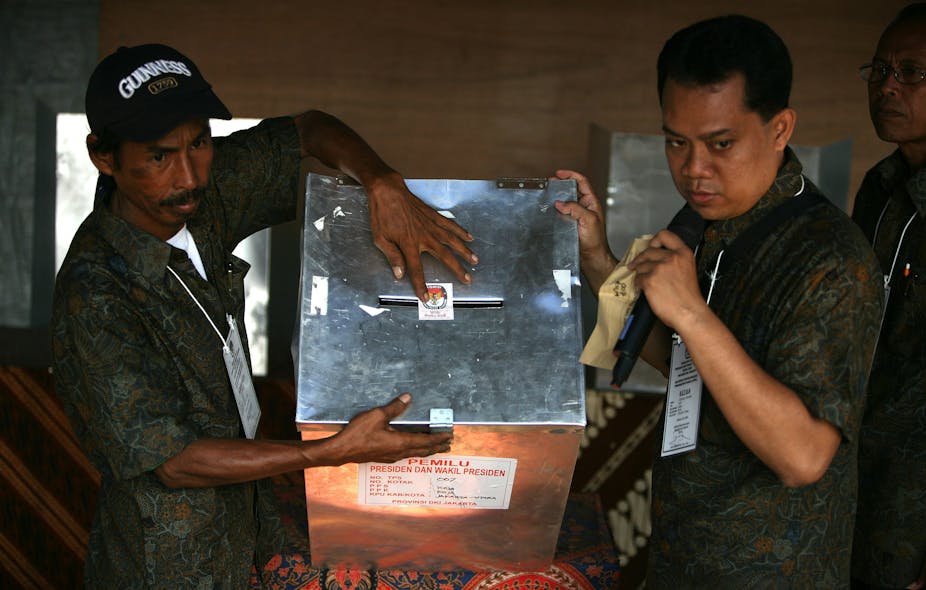Since Indonesians cast their votes on Wednesday, the big question remains: who will be the official winner of the presidential election when the final count is declared on July 22? That both candidates claimed victory perplexes both Indonesians and international observers alike.
Had Jakarta governor Joko Widodo won because most quick count results show him winning the race? Or did former military general Prabowo Subianto, as there are also some pollsters that show him leading?
Irrespective of unofficial survey results, the most important thing right now is the official vote count being carried out by the Indonesia Election Commission.
Reading the quick count numbers
Survey agencies such as RRI (Republic of Indonesia Radio), Kompas research and development team, CSIS-Cyrus Network, Indikator Politik Indonesia, Saiful Mujani Research and Consulting and Poltracking stated that the candidate popularly known as Jokowi leads by an average of 52% of votes over Prabowo, who gained an average of 47% of votes.
Meanwhile, results by pollsters such as Puskaptis, the National Survey Institute (LSN), Indonesia Vote Network (JSI) and Indonesia Research Centre show Prabowo winning 50% votes to Jokowi, who garnered 49%.
If we look at the quick counts from pollsters that show Jokowi getting 5% more votes than Prabowo, with a 1% margin of error, we can confidently conclude that Jokowi won the presidency.
Results from survey centres such as LSN and JSI, which show Prabowo winning with a slim margin of 1-2% and a margin of error of 1-2% cannot be relied on. Under statistical principles, if the difference between the quick count results is around the same as the margin of error, we cannot really make any conclusions from the data.
A step-by-step counting process
The Election Commission is tallying all the votes cast in the vast archipelago. Under Indonesia’s 2008 law on the presidential and vice-presidential election, the commission will count the votes gradually, progressing from the districts to the provinces and finally the national level.
The commission is counting the votes from 478,685 polling stations across Indonesia. From the village level, the election commission will tabulate the numbers for the districts.
The counting process for the 6,890 districts runs from July 13 to 15. The district level vote counts will go up to 497 counting stations at the city and regency level. Their counting process is from July 16 to 17.
Counting continues to the provincial level on July 18 to 19 and finally goes to the nationwide vote count on July 20 to 22. The Election Commission will announce Indonesia’s president for the next five years on July 22.
Danger spots in counting process
Guarding the votes during this 12-day counting process is crucial.
From past experiences, especially in April’s legislative election, villages and districts are the most vulnerable areas for cheating to happen.
It takes six days to tabulate the votes at the villages to the district level. Electoral fraud is possible here for a number of reasons.
First, there are not enough field supervisors and election committee members compared to the number of villages and districts that need to be monitored. This results in a weak monitoring system.
Second, as the public loses interest in the counting process once the vote count goes up to the district level, there might be less public scrutiny. Third, there is a possibility of human error while entering data from the polling stations to the district level counting station.
There are also questions surrounding the integrity and independence of Election Commission staff on the ground. After evaluating the performance of its staff during the legislative election, the commission found cases of money politics, in which bribes were accepted to change the vote count.
The candidates’ competing victory claims will mobilise the network of supporters of Prabowo and Jokowi from the ground up. Supporters from both camps might intimidate Election Commission staff, especially in the villages and districts. Senior commission staff at the city and regency levels should make sure that their teams in the villages and districts stay focused and independent.
Election Commission must assert authority
The Election Committee should continuously remind the public that its result is the final and official count. This is important to avoid potential conflicts among supporters of each candidates.
Due to the existence of poll results that show their candidate winning, each group of supporters might feel certain that the result that shows their candidate’s victory is the accurate one. To increase people’s trust in the official result, the commission should educate the people about the counting process.
Only by making sure that the counting process is free from fraud will the winner of the presidency announced on July 22 reflect the people’s choice.

